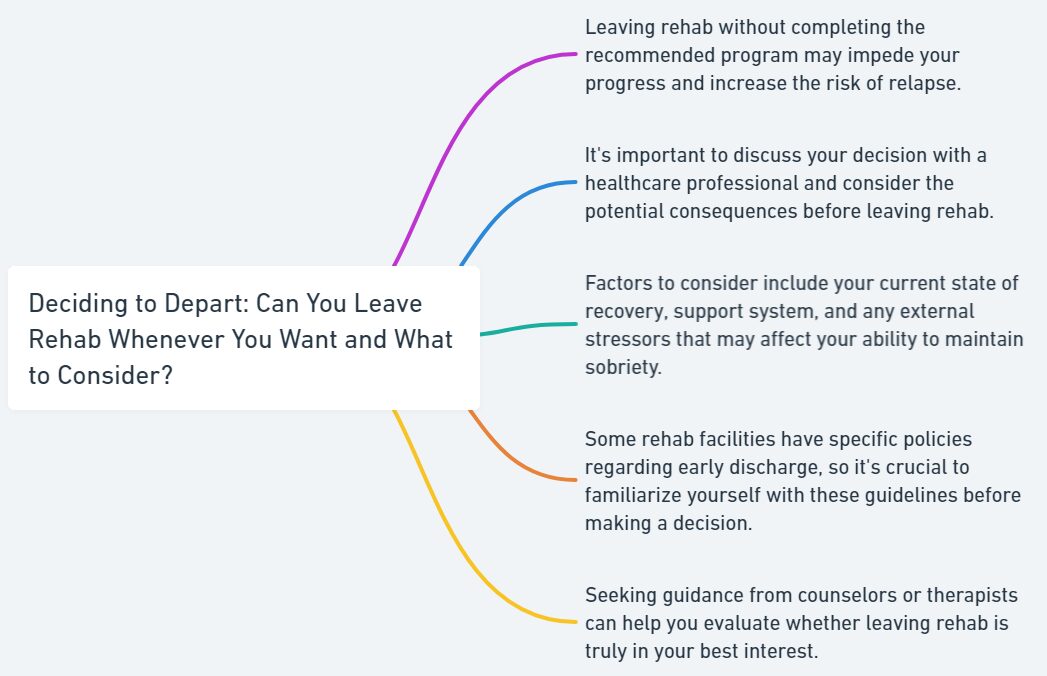Deciding whether to stay or leave rehab can be a daunting decision, with life-altering consequences at stake. A common question that arises is, “can you leave rehab whenever you want?” Understanding your rights in rehab and the implications of leaving early is crucial in making the best choice for your recovery journey. In this blog post, we will delve into the complexities of rehab programs, discuss the potential risks and consequences of leaving early, and explore the reasons behind early departures. Armed with this knowledge, you’ll be better equipped to navigate the challenges of addiction treatment and make informed decisions about your recovery.
Key Takeaways
- Understanding your rights and the potential consequences of leaving rehab early is essential for making informed decisions.
- Drug use, emotional distress, incompatibility with treatment plans can all contribute to premature exit from rehab.
- Strategies such as journaling, physical activity and support groups are important for maintaining sobriety and achieving a positive outcome in recovery.
Understanding Your Rights in Rehab
Understanding your rights in a rehab center is crucial, as it enables you to make decisions about your treatment and whether to stay or leave rehab early. Before making any hasty decisions, it is recommended to observe your medical condition for at least 24 hours. A good rehabilitation program can provide you with essential resources and information for your future, especially in overcoming drug abuse. Rehab centers like Rehab Clinics Group offer:
- Respect
- Convenience
- Superior lodging
- Proficiency
- Comprehensive assistance
These ensure you receive the support you need throughout your journey.
In rehab, you’re entitled to a successful treatment program that respects your rights and addresses your needs. Acknowledging your rights and potential outcomes of leaving rehab early helps you make decisions about your treatment plans and long-term recovery.
The Immediate Impact of Leaving Treatment Early
Leaving rehab early can have immediate detrimental effects on your physical and mental health, interpersonal relationships, and legal standing. For opioid users, leaving rehab prematurely can increase the likelihood of overdose due to the development of tolerance to their substance(s) of choice and their body no longer being exposed to drugs or alcohol. Furthermore, leaving rehab early may strain relationships with family and friends who are aiding in your recovery. For those in rehab due to a court order, legal repercussions may ensue.
If an individual is contemplating premature exit from a treatment center, their departure should be delayed for 12-24 hours. This precaution allows for a more thoughtful examination of the decision and reduces the risk of negative consequences associated with leaving treatment early.

Navigating the Complexities of Addiction Treatment Programs
The intricacies of addiction treatment programs can be daunting, yet comprehending the process and the range of available options can assist you in making the most suitable choice for your recovery. Some strategies for retaining individuals in treatment are:
- Offering longer treatment programs lasting significantly longer than 90 days
- Providing support and counseling to address any concerns or issues that may arise during treatment
- Educating individuals about the benefits of completing the full treatment program
- Creating a supportive and welcoming environment within the treatment facility
- Offering aftercare programs and support to individuals after they complete their initial treatment
In the drug treatment arena, it is crucial to implement strategies that address the concerns of individuals who may be considering the decision to leave drug treatment ama (against medical advice).
If you or a loved one is contemplating an early exit from rehab, seeking guidance from a medical professional and considering alternative treatment options is vital. Maintaining progress in the healing process is of utmost importance for long-term recovery.
The Consequences of Exiting Rehab Against Medical Advice (AMA)

Exiting rehab against medical advice (AMA) can lead to serious consequences. An increased likelihood of relapse, overdose, and potential long-term health complications are just a few of the risks associated with leaving rehab AMA. The percentage of those addicted to the substances, who leave the treatment centre against the court order or medical advice is between 3-5%. On average, this figure stands at 17%. Failing to consult a medical professional prior to discontinuing rehabilitation treatment could put one’s life in jeopardy.
It’s important to consider the risks and possible outcomes of leaving rehab AMA. Although each person’s situation may differ, the dangers associated with this decision should not be taken lightly. Seeking guidance from medical professionals and understanding the potential consequences can help you make the best decision for your recovery.
Exploring the Reasons Behind Early Departure from Rehab

Various factors can result in premature termination of rehab, such as the temptation of drug use, emotional distress, and incompatibility with the treatment program.
The following sections will elaborate on these reasons and explain their contribution to early departures from rehab.
The Lure of Drug Use and Its Role in Premature Exit
The desire to use drugs again can be a powerful motivator for leaving rehab early. After detoxing in an addiction treatment facility like Lantana drug rehab, negative emotions and issues that were previously avoided through substance use may resurface, leading the individual to use again to avoid confronting them. Uncovering the psychological factors that fuel the desire to use drugs after detox is vital for maintaining sobriety.
Additionally, addressing biological and physiological factors, and creating coping strategies to manage cravings and avoid relapse after detox are crucial. Being mindful of your surroundings and having a supportive and drug-free environment can significantly influence the temptation to use drugs again after detox.
Emotional Overwhelm and Mental Health Challenges
Individuals in rehab commonly experience the following mental health issues:
- Anxiety disorders
- Mood disorders (such as depression and bipolar disorder)
- Schizophrenia
- Post-traumatic stress disorder (PTSD)
Leaving rehab early due to emotional overwhelm and mental health issues can carry several risks, such as potential relapse, overdose, and the potential to undo progress made in treatment. One must consider possible outcomes and seek appropriate support before deciding to leave rehab prematurely.
Rehab treatment addresses emotional overwhelm and mental health challenges by:
- Recognizing and validating emotions
- Providing therapy to manage overwhelming feelings
- Establishing objectives and tracking progress
- Utilizing cognitive-behavioral therapy (CBT)
- Treating both substance abuse and mental health issues in therapy
Working through these challenges in a supportive environment enables individuals to manage their emotions and mental health more effectively while maintaining their commitment to recovery.
Misalignment with the Treatment Plan or Program
Patients may prematurely terminate their rehabilitation if there is a misalignment with the treatment plan or program. If your treatment plan or program doesn’t seem to work, it’s valuable to voice your concerns to your treatment team. This open communication can help address potential complications and ensure the best possible outcomes for your recovery journey.
Strategies to Stay Engaged in Your Recovery Process

Implementing strategies to stay engaged in your recovery process can help you overcome the challenges of rehab and increase your chances of long-term success. Some effective strategies include:
- Journaling to facilitate expression and processing of emotions
- Tracking progress
- Recognizing negative thought patterns
- Engaging in physical activity
- Maintaining a healthy diet
- Practicing mindfulness and meditation
These strategies can help increase self-awareness, emotional regulation, and promote relaxation and stress reduction.
Utilizing these strategies and working in partnership with therapists can help maintain your engagement and motivation throughout the rehab process. Developing a relapse prevention plan, engaging in aftercare programs, and seeking support from peers and support groups can provide ongoing support and motivation, ensuring the best possible outcomes for your recovery.
The Path Forward After Choosing to Leave Rehab
If you decide to leave rehab early, having a plan for continuing your recovery journey and addressing any possible consequences of your decision is crucial. Premature discharge from a rehabilitation program may be associated with:
- Increased risk of relapse
- Untreated withdrawal symptoms
- Lack of support and accountability
- Emotional and psychological challenges
- Limited access to resources
It is important to carefully consider the potential risks and challenges before making the decision to leave rehab early, as many people leave rehab early without fully understanding the consequences.
Implementing measures such as:
- Adhering to the aftercare plan provided by the rehab facility
- Constructing a support network of family, friends, and peers
- Participating in self-care activities
- Steering clear of triggers and high-risk situations
- Establishing healthy coping mechanisms
- Remaining connected to recovery resources
can help ensure sustained recovery.
Consider seeking alternative treatment options at an outpatient treatment program after leaving rehab early, such as:
- Support groups
- Therapy
- Outpatient treatment
- Sober living homes
- Alternative therapies
Continuously working on your recovery and staying committed to your sobriety can help mitigate the risks associated with leaving rehab early. For more information on how an outpatient drug treatment program can supplement your recovery, read our complete guide to outpatient drug rehab.
Ensuring a Positive Outcome: The Importance of Completing Treatment
Completing your treatment program is crucial for a positive outcome and for minimizing the risk of relapse, overdose, and other long-term consequences. The benefits of completing a treatment program in rehab include:
- Eliminating temptation and decreasing the risk of relapse
- Acquiring a more comprehensive comprehension of addiction and its underlying issues
- Acquiring new coping skills and strategies for sustaining sobriety
- Restoring damaged relationships and bettering communication
- Constructing a support network of peers who comprehend the difficulties of recovery
- Enhancing physical health through exercise and healthy practices
- Dealing with co-occurring mental health disorders
- Generating a basis for a significant and gratifying life
Research indicates that completing treatment is associated with a greater likelihood of success. By fully committing to your treatment program and addressing the challenges of rehab head-on, you can increase your chances of long-term success and ultimately achieve a fulfilling life in sobriety.
Summary
Deciding whether to stay or leave rehab is a complex and challenging decision, but understanding your rights, the potential consequences of leaving early, and the reasons behind early departures can help you make the best choice for your recovery. By staying engaged in your treatment program, implementing strategies to overcome challenges, and seeking support from your treatment team and loved ones, you can increase your chances of long-term success and a fulfilling life free from addiction. Remember, the road to recovery may be difficult, but the rewards of a healthier, happier life are well worth the journey.
Frequently Asked Questions
What are the benefits of recovery?
The benefits of recovery are numerous, including improved physical health, better sleep and increased energy, healthier eating, a return to healthy weight, improved immunity, and improvement or elimination of other medical conditions.
Why is consistency important in recovery?
Consistency is essential for a successful recovery; it allows us to stay focused and provides the necessary structure and routine that helps us reach our goals. Without consistency, progress may be harder to maintain, leaving us feeling discouraged and demotivated.
Can a depressed person go to rehab?
Yes, people with depression can go to rehab for treatment and support. Rehab offers a range of therapies to help those dealing with mental health conditions.
Why do people go to rehab?
People go to rehab to address their drug and/or alcohol addiction, so that they may receive the medical and psychotherapy treatments necessary to improve their overall wellbeing.
What are the potential consequences of leaving rehab early?
Leaving rehab early can have serious consequences, such as increased risk of relapse and overdose, as well as detrimental effects on physical and mental health, interpersonal relationships, and legal standing.
How much does drug rehab typically cost, and are there financing options available?
The cost of drug rehab varies based on factors such as the type of program, duration, and amenities offered. Inpatient facilities tend to be more expensive than outpatient options. Costs may include therapy, accommodation, meals, and support services. Some facilities accept insurance, and financing options or sliding-scale fees may be available based on financial need. For more information, read our complete guide on drug and alcohol rehab cost.



